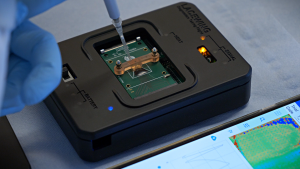Investigators from the Centre for Antimicorbial Optimisation (CAMO) have developed a handheld point-of-care diagnostic system for the rapid detection of SARS-CoV-2 and Aspergillus fumigatus. Led by Dr. Pantelis Georgiou from the Department of Electrical and Electronic Engineering in collaboration with Dr. Jesus Rodriguez-Manzano and Professor Alison Holmes from the Department of Infectious Disease, this novel technology performs nucleic acid amplification (DNA and RNA) in under 30 minutes in the palm of your hand. The system consists of (i) a portable Lab-on-Chip device called Lacewing, (ii) a disposable cartridge which combines state-of-the art microchip technology and microfluidics, and (iii) a smartphone application to monitor the reaction in real-time, visualize the results and perform geo-tagging using a smartphone GPS. Nucleic acid amplification reactions are performed within the single-use cartridge using loop-mediated isothermal amplification (LAMP), a rapid alternative to conventional PCR which does not require thermal-cycling.

Supported by the Imperial College COVID-19 Response Fund, Rodriguez-Manzano et al. (2020) adapted this system for rapid (<20 miniutes) and sensitive detection of SARS-CoV-2. A novel LAMP assay with a limit of detection of 10 copies was developed based on phylogenetic analysis and validated on 183 clinical samples. A subset of samples was further validated on Lacewing, demonstrating a comparable performance to a benchtop commercial instrument. More details can be found in the recent MedRxiv publication.
In response to the emergence of antimicrobial resistance, Yu et al. (2020) repurposed Lacewing for the rapid detection of azole-resistance Aspergillus fumigatus. This work was carried out in close collaboration with Professor Matthew Fisher from the School of Public Health at Imperial Colleg LAMP assays targeting the two most relevant genetic markers linked to azole resistance, tandem-repeat 34 (TR-34) and TR-46 were developed. The assay showed a limit of detection of 10 copies/reaction under 30 minutes, and it was validated with isolates from clinical and environmental samples from 6 countries across 5 continents. More details can be found in the recent publication on the Journal of Clinical Microbiology.
Article contribution: Pantelis Georgiou and Jesus Rodriguez-Manzano